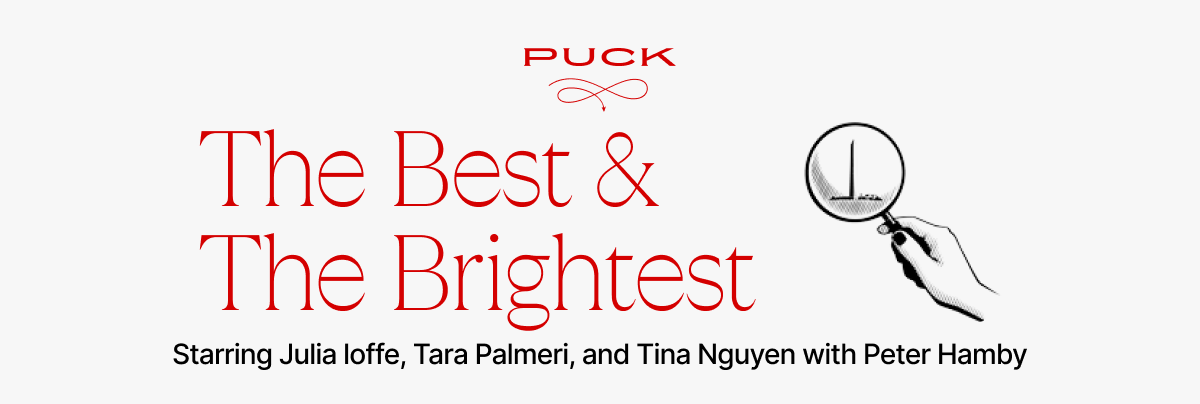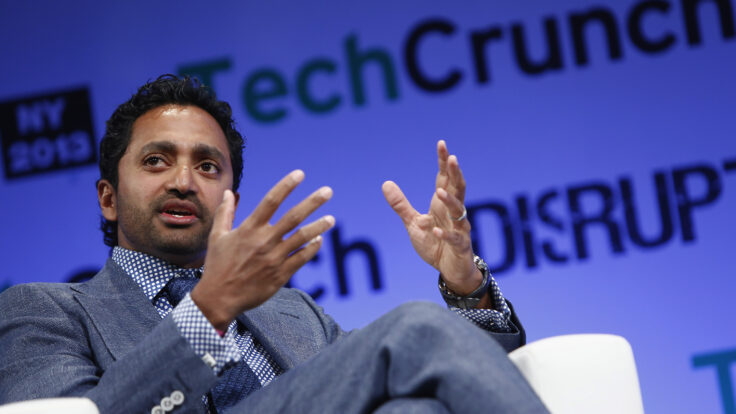 |
 |
|
Hello, and welcome back to The Best & The Brightest, your Tuesday foreign policy edition—though it’s been hard to focus on anything but Kevin McCarthy’s ouster today. In the meantime, Democrats are standing back and watching it burn—and I’m hearing from people close to House Democratic leadership that, while the ashes of the Republican civil war smolder after this fight, they’re hoping a few moderate Republicans cross the aisle and vote to make Hakeem Jeffries speaker.
More on this absolute and utter clown show below, from our very own Abby Livingston. But first…
🚨Some Personal News! I wanted to tell you before I told anyone else: Tomorrow, my new podcast drops! It’s a narrative, five-episode podcast called About a Boy: The Story of Vladimir Putin, and it’s based on a story I wrote for Puck last May about Putin’s childhood in the dvor. (Listen and subscribe here!)
The dvor is, literally, a courtyard, but for people of Putin’s generation—the Soviet baby boomers—it was a place where children learned the social code of Soviet society: that compromise is weakness, and weakness is death, that loyalty is paramount, and that life is a zero-sum game. This was the foundry where Putin was cast.
This is, as you will hear in the first episode, a personal story for me. My dad grew up in a dvor much like Putin’s own, and I grew up hearing all about it. When I moved to Moscow and first began reporting on the Russian president, this background—and my father’s translations of Putin’s language and behaviors—proved absolutely invaluable. Moreover, I realized that most everyone in Russia saw him in the same way, as a punk from the dvor, as a street kid. It was just so obvious to them because they all grew up that way or knew someone who had.
The Americans I was writing for back home, however, had no idea about this culture or what a dvor even was. All they saw was K.G.B. and judo. Of course, those are key touchstones of Putin’s biography, as both the secret police and the martial art influenced him deeply. But here’s the thing: the reason he got into judo, and the reason he joined the K.G.B., is because of what came before it, because of his first experience as a social being in the world, in the dvor. In fact, he has spoken about this, openly.
And so, I’m bringing you this translation key, this additional way to see and understand this horrible man—who, in many ways, is just a small, angry boy from the dvor—and to understand what he might do in Ukraine and in the future. It’s a kind of crash course in the history, sociology, and anthropology of the dvor and how it molded Putin into the person he is today. It features my dad, as well as some of my friends and colleagues you’ve seen quoted here, like David Remnick, Fiona Hill, Nina Khrushcheva (yes, relation), Andrew Weiss, Yevgenia Albats, Mikhail Zygar and others. And, yes, it drops just in time for Putin’s 71st birthday on October 7.
The first two episodes will be available tomorrow morning at 3 a.m. EST here (or wherever you listen to podcasts), followed by one a week until we wrap things up on the 25th. I hope you enjoy listening to it as much as I enjoyed working on it with director Valerie Thomas and producer Margo Gray, who are now my new best friends. Enjoy!
And now, that congressional update from Abby…
|
|
|
| The sudden political collapse of Kevin McCarthy, who was ousted as House speaker on Tuesday by eight Republican “yes” votes, wasn’t shocking, or even surprising. After all, McCarthy’s fate was more or less sealed when he handed Matt Gaetz and his far-right allies the power to initiate a single-vote motion-to-vacate in exchange for their support in January’s leadership race—a gesture of short-minded politicking that perfectly captured how much he was willing to sacrifice to reach the top, even momentarily, of the greasy pole. One might even trace the antecedents of his political demise to last November, when the G.O.P. failed to capture enough House seats in 2022 to give McCarthy any breathing room.
Of course, that hardly mitigates the enormity of what transpired Tuesday inside the Capitol, which is virtually incapable of passing legislation until a new speaker is chosen. In short, the House is ungovernable, and it’s not clear how this crisis resolves itself. Here’s what we know so far.
1. There’s no clear successor: McCarthy is the first House speaker ever to be ousted, and he was defenestrated without any plan for his replacement. Indeed, in the immediate aftermath of the vote, there is no obvious replacement for the now-former speaker. Among the early names circulating are Steve Scalise, the majority leader; Patrick McHenry, the financial services chairman, McCarthy deputy and freshly-installed speaker pro tempore; Tom Emmer, the majority whip; Elise Stefanik, the House G.O.P. conference chair; and Jim Jordan, the Judiciary chairman. But things are moving fast. When Jake Tapper asked Rep. Tim Burchett, one of the eight Republicans who voted to remove McCarthy, whether he expected there to be a new speaker before tomorrow, Burchett replied, “I have no earthly idea, brother.”
2. The schadenfreude is real: It’s hard to overestimate the frustration, and even fury, emanating from Capitol Hill following Gaetz’s no-confidence vote, in which he was joined by seven Republicans—Bob Good, Nancy Mace, Matt Rosendale, Eli Crane, Andy Biggs, Ken Buck, and Tim Burchett—plus every House Democrat. The Mace vote, in particular, stunned a number of Hill Republicans. The following comments came into my phone on Tuesday afternoon: “Reap what you sow”… “inmates running the asylum”… “no one believes in anything anymore” … “total circus,” and so on. And that was the commentary among Republicans.
The vibe around some Republican circles on the Hill late Tuesday afternoon resembled a wake: horror, fear, and relief that the ordeal was over. Establishment-ish Republicans were beyond furious with Gaetz and the rebels, and despondent that McCarthy did not have the political skills to better handle or preempt an entirely predictable political crisis.
3. Jeffries is in control: Meanwhile, on the Democratic side, there was no sympathy for McCarthy, despite some last-minute pleas for their support. Most of the Democratic members I spoke with on Tuesday don’t trust McCarthy, and they saw no point in negotiating with someone who refused to make concessions. But also, do not underestimate how deep the wounds are from how McCarthy handled Jan 6.
Notably, this was the first real test of Hakeem Jeffries’ leadership in which his predecessor and mentor, speaker emeritus Nancy Pelosi, was offstage in San Francisco (to honor the passing of Dianne Feinstein). Jeffries demonstrated full control of his caucus, according to conversations with several House Democratic members. Yes, they’re in the minority, but even Democrats who pride themselves on amicable relationships with Republicans were cold-blooded and resolute about throwing McCarthy out. Jeffries simply heard them out.
4. Partisan lines held: There was speculation throughout the day that moderates from one party might be lured across the aisle to either save McCarthy or even to elect Jeffries. But as of late Tuesday afternoon, nobody crossed the aisle. It’s worth remembering, of course, that the speaker and minority leader are top fundraisers for the N.R.C.C. and the D.C.C.C., groups that spend millions bashing the other side’s moderates on television and personally terrorizing incumbents on social media.
Alas, we are in a new dimension of politics right now, and it strikes me as counterintuitive that moderates would want to ever extend a hand to the other side’s leader. Stranger things have happened, but such coalition-building would require a major reorganization of the partisan infrastructure.
5. Everyone is sick of this shit: For weeks, Republicans have warned me that retirements are probably coming from the House G.O.P. conference. That speculation is on steroids now. I checked in with a few sources and one former Republican Hill staffer sent back a gif of Jimmy Fallon with the caption “YES! YES! YES!” Politics just isn’t fun or productive anymore for pragmatic-minded members, and there’s less upside than ever to serving in the House these days. But it’s all self-defeating for the establishment: the kinds of Republicans who might retire are likely to be replaced by future rebels. Things are falling apart, and it’s an open question whether the right-of-center can or cannot hold.
But it’s also worth watching the staffer class, and whether the quality, seasoned Republican operatives who came of age under John Boehner and Paul Ryan are still willing to work for a government salary after this. There are more than a few dazed Alex P. Keaton-types looking around the Capitol and wondering why they should even bother sticking around.
And now back to tonight’s column…
|
 |
| Ukraine’s Darth Vader & The Pentagon’s Voodoo Economics |
| On one level, it’s been a terrible week for Ukraine: the House passed a CR that doesn’t include aid and Slovakia, its neighbor, elected a pro-Russian madman. But actually, believe it or not, things aren’t quite as bad as they seem—at least not yet. |
|
|
|
| Two big things happened for Ukraine outside of its borders over the weekend. The first happened here, in Washington, when the House of Representatives surprised everyone and passed a short-term funding measure that would allow the U.S. government to function until mid-November. The measure, however, notably did not include any aid for Ukraine. The Ukraine proposal had gone from $24 billion to $6 billion and then to zero. The second was the parliamentary elections in Slovakia, where a populist named Robert Fico led his party to victory, in part on promises not to send any more aid—“not a single bullet”—to Ukraine.
Both developments, understandably, have sent jolts of panic through Ukraine’s allies both here and in Europe. Western media haven’t helped their jitters either. The narrative, especially when it comes to Slovakia’s elections, is that this is the first real crack in the West’s unity on Ukraine. And, with Poland’s elections on October 15 and Congress’s inability to predictably fund the U.S. government, let alone Ukraine, the dam seems like it’s starting to break. This, after all, has been Vladimir Putin’s plan since it became clear he couldn’t take Ukraine in one quick hit: wait out the West, which, unlike his autocratic regime, has a real range of opinions and where elections are real.
From what I’m hearing, however, it’s a little too early to be freaking out, at least when it comes to the short term.
|
|
A MESSAGE FROM META
|
| |
 |
| The future of training is happening today, in the metaverse.
Thanks to a VR training tool created by ForgeFX, students across the country can gain virtual hands-on experience from the Tulsa Welding School—which means more aspiring welders can access quality training and more jobs can be filled by skilled workers.
Explore the impact.
|
|
|
| First, the American side. The Pentagon’s comptroller Michael McCord sent a letter to House Minority Leader Hakeem Jeffries on Friday, warning him of the consequences of failing to allocate more funding for Ukraine. The Ukraine Security Assistance Initiative, the program by which the U.S. gives money to the Ukrainian government to buy American weapons, has run out of money, McCord warned. But some money remains. Over the past 18 months, Congress has repeatedly authorized the president to spend money to restock the Pentagon’s shelves, for a total of $29 billion. Using this presidential drawdown authority, the White House could send Ukraine weapons, ammunition, and equipment as long as it costs no more than $29 billion to replace it.
That money looked to be almost out this summer until, as I wrote last week, a bit of accounting wizardry in the Pentagon magically and suddenly gave the White House some wiggle room. They did this by repricing—or, essentially discounting—the costs of various weaponry and munitions, most of which don’t exactly have a commonly agreed upon market price. As one source told me, “There’s no Kelley Blue Book value on a used Bradley.” So how much does it really cost to replace it? Who knows! And so, after tweaking these values and re-crunching the numbers, the Pentagon discovered it actually had over $6 billion more in drawdown funds than it originally thought. (“This is why the Pentagon can never pass an audit,” the source joked.)
This is also why the people I spoke with in the administration and on the Hill, both Democrats and Republicans, didn’t seem that worried. “In the short term, it won’t have much effect—we still have drawdown authority,” one senior administration official told me. “We can fulfill their battleground needs for now. If we can’t get full funding, though, that’ll be a problem.”
According to McCord, of that original $29 billion in drawdown authority, just under $2 billion is left. Others say it’s more than that, closer to $4 or 5 billion. And according to C.S.I.S.’s defense budget whizz Mark Cancian, the U.S. goes through the drawdown at a rate of about $1.4 billion per month. So, even with the more pessimistic calculations, Biden has about a month and a half left—just enough to last until the next negotiation in mid-November.
Another, though less plausible, option is for the D.O.D. to ask for a reprogramming—that is, taking money that was allotted for, say, toilet seat acquisitions and using it instead to help Ukraine. But the deeply conservative Pentagon, focused on meticulous planning and every contingency, is deeply reluctant about doing that. (“I want to be clear,” McCord wrote to Jeffries, “the Department does not support that approach, which will create unacceptable risk to us.”) Said Cancian, who used to work on such issues at D.O.D., “They might do that for a couple weeks after that they’ll start to complain.”
Still, there isn’t panic in D.C.—at least not about Ukraine funding. The fact of the matter is that it remains deeply and broadly popular on the Hill and if the next speaker—whoever the hell that might be—would just bring it to a vote, it would pass overwhelmingly. “We’ll get there,” said the administration official. “We have time to get it done.”
|
|
|
| Most Western outlets have labeled Slovak politician Robert Fico (pronounced “FEE-tso”) “pro-Russian” and so his party’s victory on Saturday, of course, sounds very ominous: Slovakia, a NATO member, shares a border with Ukraine and was the second country, after Poland, to pledge warplanes for Kyiv’s fight. In fact, Slovakia promised Ukraine its entire fleet—of 13 MiGs—and delivered. Now, Fico’s Smer party has won on a campaign of cutting off all aid and blaming Ukraine and the West for starting the war. Like other populists, he has said that all military aid to Ukraine does is create “more killing” and he has referred to “Ukrainians Nazis and fascists.”
But is Fico really pro-Russian? And will he really pull Slovakia out of the coalition supporting Ukraine? Unlikely, say even people who loathe him. “I think he’ll make a grand gesture that won’t mean much,” said Dalibor Rohac, of the American Enterprise Institute.
Fico, it seems, is a rather complex character. “One thing I noticed in Western media coverage of this is that people don’t realize what an intelligent pragmatist Fico is,” one Slovak government official who is opposed to Fico told me. “He looks like this gigantic pig. But he’s super educated, he’s a lawyer, and he probably had aspirations to work for the European Court of Human Rights or to serve on the Constitutional Court.” But life and politics happened, and this erstwhile liberal became one of the many anti-Western populists—like Viktor Orban—terrifying Euro-centrists on both sides of the Atlantic. “He’s like Darth Vader,” the official explained. “He decided to go to the dark side.”
Fico has already been prime minister twice, and the second go-round ended in disaster. He was forced to resign after a hitman killed a young Slovak investigative journalist, Ján Kuciak, and his fiancée. Kuciak had been investigating government corruption, including in Smer’s ranks, and the protests after Kuciak’s murder forced Fico out. “Afterwards, he became super vindictive, and began drinking like crazy,” the Slovak official recounted, saying that people would often see Fico drunk all over Bratislava. “Then he got his shit together and decided to get back at all these people. Unfortunately, he is using his intellect for all the wrong causes.”
|
|
|
| Fico had always flirted with right-wingers and populism, but this year, it presented the clearest path to power. It also presented an obvious opportunity to evade a closing noose of corruption investigations. (In this sense, he is much like Donald Trump and Bibi Netanyahu.) Some three dozen of Fico’s associates have already gone to jail and prosecutors are circling ever closer to Fico himself. If he can become prime minister, he can appoint the head of the Interior Ministry, which oversees the police and the investigators into his dealings. “It’s his primary motivation to become prime minister,” the Slovak official explained. “Basically, he’s thinking, My life is on the line, I will do anything in my power to win. So I’ll say what 45 percent of the population of Slovakia wants to hear. He picked up on a narrative that no one wanted to feed.”
That narrative is an anti-American, anti-Western, anti-establishment one that is very popular in a country that is still largely rural and regularly lands on the bottom of European education rankings. Moreover, according to Rohac, the Slovaks have a history quite different from the anti-Russian Czechs with whom they once shared a country. During the 19th-century wave of romantic nationalism, the Czechs went all in. The Slovaks went with the pan-Slavism emanating from Russia. And when Soviet Moscow sent in the tanks in 1968 to crush the Prague Spring, “there was an asymmetry in how it was felt in the Czech and Slovak parts of Czechoslovakia,” said Rohac. “Czechs felt it much more strongly and formed a real dissident movement. The Slovaks didn’t.” In fact, said Rohac, “One of the consequences of ‘68 was that it gave more power to Slovak apparatchiks.” They didn’t mind that.
Putin has been adept at exploiting this gap. Ever since Russia’s initial invasion of Ukraine in 2014, Moscow has launched an intensive disinformation campaign in Slovakia, hoping to create another fissure inside the E.U.—and perhaps another vote against Russia sanctions. “It’s been insane here for nine years,” the Slovak official complained. “The Russian Embassy here, they have 80, 90 people and that’s all they’re doing.” The disinformation actually works well in Slovakia’s vibrant media ecosystem: non-mainstream outlets spreading Russian narratives are constantly sprouting up and few think anything of it. “The population is extremely susceptible here because it’s the least educated population in central Europe,” the Slovak official continued. “We kind of value being uneducated. There’s a big anti-intellectual streak in Slovakia. Our education hasn’t been reformed in 30 years. It doesn’t emphasize critical thinking. The Russians picked up on it immediately and started bombarding us.”
As a result, according to GLOBSEC, a think tank in Bratislava, Slovaks are more prone to believe Russian disinformation than their neighbors. For example, Slovaks are more likely to believe that the West was responsible for the war in Ukraine, not Russia, and about half of them see the U.S. as a national security threat. “We’re always at the bottom” of surveys ranking what proportion of European countries believe the Moscow line, said Rohac.
Mining this rich stream, it seems, was Fico’s easiest path to power. That said, he won less than a quarter of the vote and now has to form a coalition. The partners available to him are all pro-Western and pro-Ukraine. One potential coalition partner is Fico’s former lieutenant, Peter Pellegrini. “Fico will be leading a coalition where Pelligrini will insist on some guarantees that Slovakia won’t go full Orban,” Rohac predicted.
Moreover, even if Slovakia were to cut off all military aid to Ukraine—Fico has been clear that he doesn’t want to suspend humanitarian aid—Slovakia has pretty much already emptied its stores. Whatever it had to send to Ukraine has already been sent—nor did it make a big impact compared to Ukraine’s need and to what other allies provided.
What Slovakia does have is a healthy defense sector that makes some of the very things that Ukraine needs, like demining equipment. That sector provides good-paying jobs for Slovaks—and political contributions to Fico’s party. “They have keen interests in this,” said Rohac. “And that’s another moderating influence.” Not only that, said the Slovak official, “he knows full well that there will be a ton of money flowing to Ukraine for reconstruction and we’re right on the border. Slovak companies want access to that.”
To be sure, there’s always a lot of magical thinking that a nutter politician spouting hate will somehow be different from who he’s always said he’s been. Look at Trump and all that hope that he’d suddenly one day turn “presidential.”
But Fico has already been hard at work, pivoting toward the center. On Sunday, less than 24 hours after his victory on Saturday night, Fico was already thanking local journalists for attending and expressing a hope that they would have a good working relationship—after calling them “anti-Slovak prostitutes.” He also said that, despite his own opinion, if his party was part of the governing coalition, Slovakia’s position toward Ukraine would stay the same.
“What I think will happen is Fico will try to save face in front of his electorate and say, I would totally do this [suspend aid to Ukraine] but our coalition partners wouldn’t do it,” said the Slovak official. “He’ll do what’s best first and foremost for his own ass, and then Slovakia. He is by far, by far the smartest politician in Slovakia.”
|
|
|
| That’s all from me for this week, friends. Remember to check out “About a Boy,” dropping tomorrow morning—and let me know what you think!
Julia
|
|
|
|
| FOUR STORIES WE’RE TALKING ABOUT |
|
|
|

|
 |
|
|
|
Need help? Review our FAQs
page or contact
us for assistance. For brand partnerships, email ads@puck.news.
|
|
You received this email because you signed up to receive emails from Puck, or as part of your Puck account associated with . To stop receiving this newsletter and/or manage all your email preferences, click here.
|
|
Puck is published by Heat Media LLC. 227 W 17th St New York, NY 10011.
|
|
|
|



















